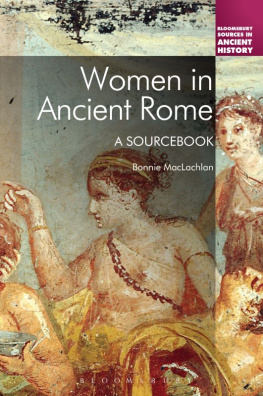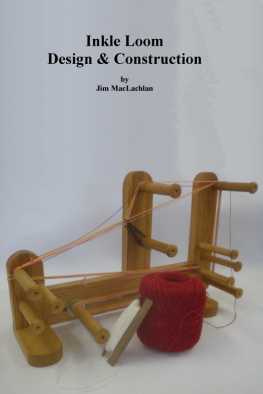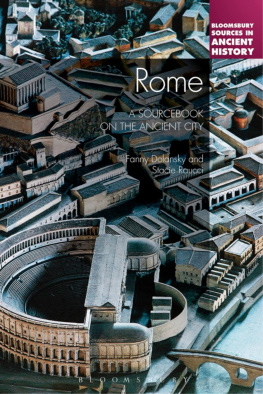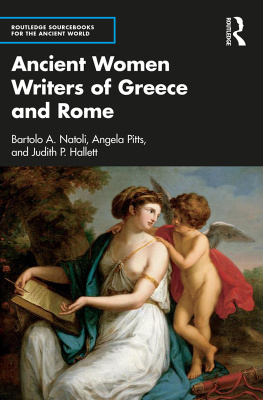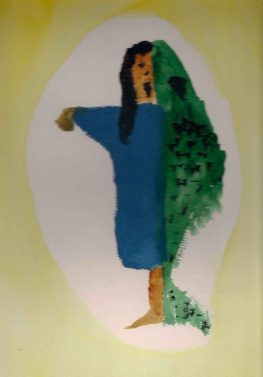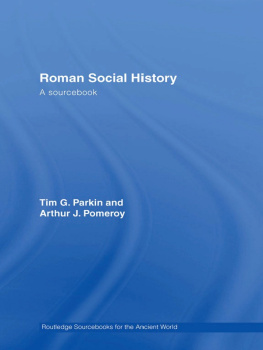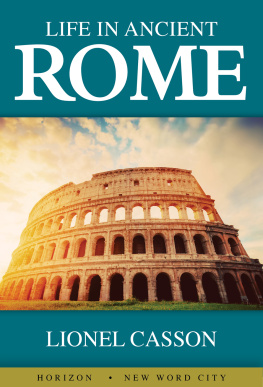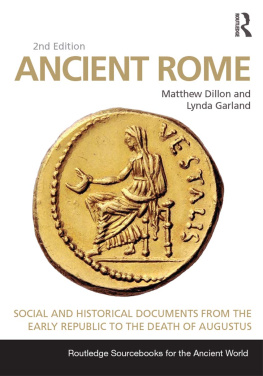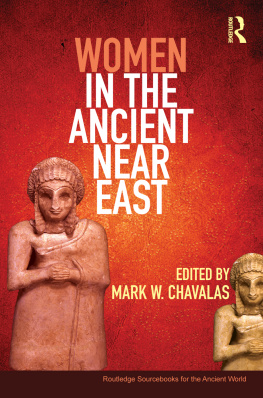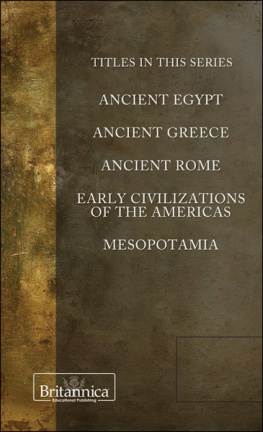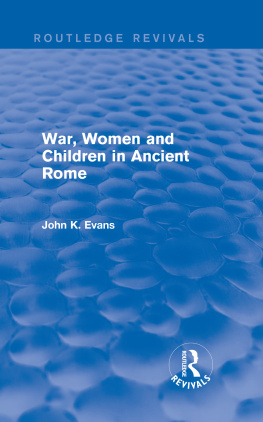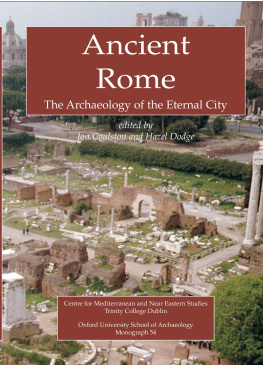MacLachlan - Women in ancient Rome: a sourcebook
Here you can read online MacLachlan - Women in ancient Rome: a sourcebook full text of the book (entire story) in english for free. Download pdf and epub, get meaning, cover and reviews about this ebook. City: Rome (Empire, year: 2014, publisher: Bloomsbury Publishing, genre: Detective and thriller. Description of the work, (preface) as well as reviews are available. Best literature library LitArk.com created for fans of good reading and offers a wide selection of genres:
Romance novel
Science fiction
Adventure
Detective
Science
History
Home and family
Prose
Art
Politics
Computer
Non-fiction
Religion
Business
Children
Humor
Choose a favorite category and find really read worthwhile books. Enjoy immersion in the world of imagination, feel the emotions of the characters or learn something new for yourself, make an fascinating discovery.
- Book:Women in ancient Rome: a sourcebook
- Author:
- Publisher:Bloomsbury Publishing
- Genre:
- Year:2014
- City:Rome (Empire
- Rating:4 / 5
- Favourites:Add to favourites
- Your mark:
- 80
- 1
- 2
- 3
- 4
- 5
Women in ancient Rome: a sourcebook: summary, description and annotation
We offer to read an annotation, description, summary or preface (depends on what the author of the book "Women in ancient Rome: a sourcebook" wrote himself). If you haven't found the necessary information about the book — write in the comments, we will try to find it.
Women in ancient Rome: a sourcebook — read online for free the complete book (whole text) full work
Below is the text of the book, divided by pages. System saving the place of the last page read, allows you to conveniently read the book "Women in ancient Rome: a sourcebook" online for free, without having to search again every time where you left off. Put a bookmark, and you can go to the page where you finished reading at any time.
Font size:
Interval:
Bookmark:
| Bernand A. and E. 1960 (eds) Les Inscriptions grecques et latines du Colosse de Memnon. Cairo | |
| Corpus Inscriptionum Latinarum. 18631959. Berlin | |
| Corpus Medicorum Graecorum. 1927. Berlin | |
| De Caesaribus | Sexti Aurelii Victoris Liber de Caesaribus. 1966 (ed.) F. Pichlmayr. Leipzig |
| Fontes Iuris Romani Antejustiniani. 1940 (eds) S. Riccobono et al. Florence | |
| Gai Institutiones or Institutes of Roman Law. 1904 (ed.) E. Poste. 1925 (revised and enlarged by) E. A. Whittuck. Oxford | |
| Inscriptiones Latinae Liberae Rei Publicae. 1963. vols 1 and 2 (ed.) A. Degrassi. Florence | |
| 2 | Inscriptiones Latinae Selectae. 1962. vol. 2, (ed.) H. Dessau. Berlin |
| Khn, C. G. 1964 (ed.) Claudii Galeni, Opera Omnia. Hildesheim | |
| Marshall, P. K. 1977 (ed.) Cornelii Nepotis. Vitae cum Fragmentis. Leipzig | |
| Oratorum Romanorum Fragmenta. 1955 (ed.) H. Malcovati. Turin | |
| . | The Oxyrhynchus Papyri 1898. London |
| Patrologiae cursus completus. Series graeca posterior. 1857 (ed.) J. P. Migne. Paris | |
| Receuil de Textes Latins Archaques 1957 (ed.) A. Ernout. Paris | |
| Skutsch, O. 1985 (ed.) The Annals of Q. Ennius. Oxford | |
| . | Tabulae Vindolandenses 2003 (eds) A. K. Bowman, J. D. Thomas and J. Pearce. London |
Women in Ancient Greece: A Sourcebook
Bonnie MacLachlan
Greek and Roman Sexualities: A Sourcebook
Jennifer Larson
Balsdon, J. P. V. D. 1962. Roman Women. Their History and Habits. London
Beard, M., J. North and S. Price. 1998a. Religions of Rome I. A History. Cambridge
1998b. Religions of Rome II. A Sourcebook. Cambridge
Bradley, K. R. 1991.. New York/Oxford
DAmbra, Eve. 2007.. Cambridge/New York
Dixon, S. 2001a.. London
(ed.). 2001b. Childhood, Class and Kin in the Roman World. London/New York
1992. The Roman Family. Baltimore, MD
1988.. Norman, OK
Fantham, E. 2011. Roman Readings. Berlin
Fantham, E., H. P. Foley, N. B. Kampen, S. Pomeroy and A. Shapiro. 1994. (eds) . New York/Oxford
Frier, B. W. and T. A. J. McGinn. 2004. A Casebook on Roman Family Law. Oxford
Gardner, J. F. 1986.. London/Sydney
1998.. Oxford
Gardner, J. and T. Wiedemann. 1991. (eds) The Roman Household. A Sourcebook. London/New York
Hallett, J. P. 1984.. Princeton, NJ
1999. Women in the Ancient Roman World in B. Vivante (ed.) Womens Roles in Ancient Civilizations. A Reference Guide. Westport, CT. 25789.
and M. B. Skinner 1997. (eds) . Princeton, NJ
Hemelrijk, E. A. 1999.. London/New York
Johnson, M. and T. Ryan. 2005.. London/New York
Joshel, S. R. 2010.. Cambridge
and S. Murnaghan (eds) 1998. Women and Slaves in Greco-Roman Culture. Differential Equations. London/New York. 92108
Keegan, P. 2004. Boudica, Cartimandua, Messalina and Agrippina the Younger: Independent Women of Power and the Gendered Rhetoric of Roman History, Ancient History 34, 99148
Kleiner, D. E. E. and S. B. Matheson 1996. (eds) I Claudia. Women in Ancient Rome. Austin, TX
(eds). 2000. I Claudia II. Women in Roman Art and Society. Austin, TX
Kraemer, R. S. 2004. . A Sourcebook. Oxford
Laes, C. 2011. Children in the Roman Empire. Outsiders Within. Cambridge
Lefkowitz, M. and M. Fant. 2005. . A Source-Book in Translation (revised edition). Baltimore, MD
. (eds) C. A. Faraone and L. K. McClure. Madison, WI. 186204
2008. Dress and the Roman Woman. Self-Presentation and Society. Abingdon, NY
Plvi, S. and L. Savunen. 1999. Female Networks and the Public Sphere in Roman Society. Rome
Rawson, B. and T. A. J. McGinn. 1991. (eds) Marriage, Divorce and Children in Ancient Rome. Oxford/New York
Richlin, A. 1983. The Garden of Priapus. Sexuality and Aggression in Roman Humour. New Haven, CT/London
Schultz, C. E. 2006.. Chapel Hill, NC
Setl, P. and Savunen, L. 1999. Female Networks and the Public Sphere in Roman Society. Rome
Skinner, M. B. 2005. Sexuality in Greek and Roman Culture. Malden, MA/Oxford/Victoria, Australia
Treggiari, S. 1979. 1, 6586
1991.. Iusti Coniuges from the Time of Cicero to the Time of Ulpian. Oxford
Warrior, V. 2002. Roman Religion. A Sourcebook. Newburyport, MA
The written record of Romes earliest historical period is a legendary one. While we cannot be sure of the degree to which these tales were based in historical reality we can be confident that in their retelling they shaped, reflected and reinforced the attitudes of the people telling and hearing them. The cultural patterns that were sustained in this way included those governing the interactions between women and men.
This story of the foundation of Rome reflected an attempt to link the Roman world to Greeces heroic past. Vergils great Latin epic The Aeneid, disseminated at the end of the last century BCE and in the early decades of the first century CE, forged a mythical link between the Roman Empire and the Trojan War. Aeneas, a Trojan prince who escaped the destruction of his city, turned his back on this chapter of his life, driven by destiny to establish a new kingdom on the Italian peninsula. Vergil describes Aeneas development as a Romanized hero in two emotional vignettes in which he detaches himself from women with whom he has had an intimate relationship but who cannot be part of his Roman destiny.
The first is his Trojan wife Creusa. With the city conquered and in flames Aeneas cries out for her, running through the streets. Startled suddenly, he sees her ghost coming out of the shadows. She explains to him that the gods have decreed that his Roman destiny does not include her.
What good is there in giving yourself over to such insane grief,
my dear husband? These things have not come to pass without the will of the gods.
Nor is it permitted for you to take your companion Creusa away from here;
not even the ruler of Olympus on high permits it.
There will be a long period of exile for you, and you must plow the vast expanse of sea
before you come to the Hesperian (Western) land, where the Lydian Tiber
flows through the fertile fields of men with a gentle swerve.
There good fortune and a kingdom and a royal wife
have been prepared for you. Banish your tears for your beloved Creusa.
(2.77784)
Creusa assured him that she would not be led away into slavery by the Greeks, for the gods had willed it that she not leave Trojan soil. After asking him to take care of their young son, she disappeared into the air. Three times Aeneas tried to clasp her, and three times her image disappeared, as Vergil says, like a fleeting dream. Aeneas departed with their son Ascanius, his aged father and a band of Trojan followers.
En route to Italy, Aeneas was blown off-course by a storm and stopped at Carthage, a city on the north coast of Africa that had been founded by the Queen Dido of Sidon, who gave him unexpected and exceptional hospitality. The heros mother, the love-goddess Venus, had arranged a passionate encounter between the two, and the relationship continued for a year until Jupiter sent a divine emissary with the directive that Aeneas depart.
Font size:
Interval:
Bookmark:
Similar books «Women in ancient Rome: a sourcebook»
Look at similar books to Women in ancient Rome: a sourcebook. We have selected literature similar in name and meaning in the hope of providing readers with more options to find new, interesting, not yet read works.
Discussion, reviews of the book Women in ancient Rome: a sourcebook and just readers' own opinions. Leave your comments, write what you think about the work, its meaning or the main characters. Specify what exactly you liked and what you didn't like, and why you think so.

